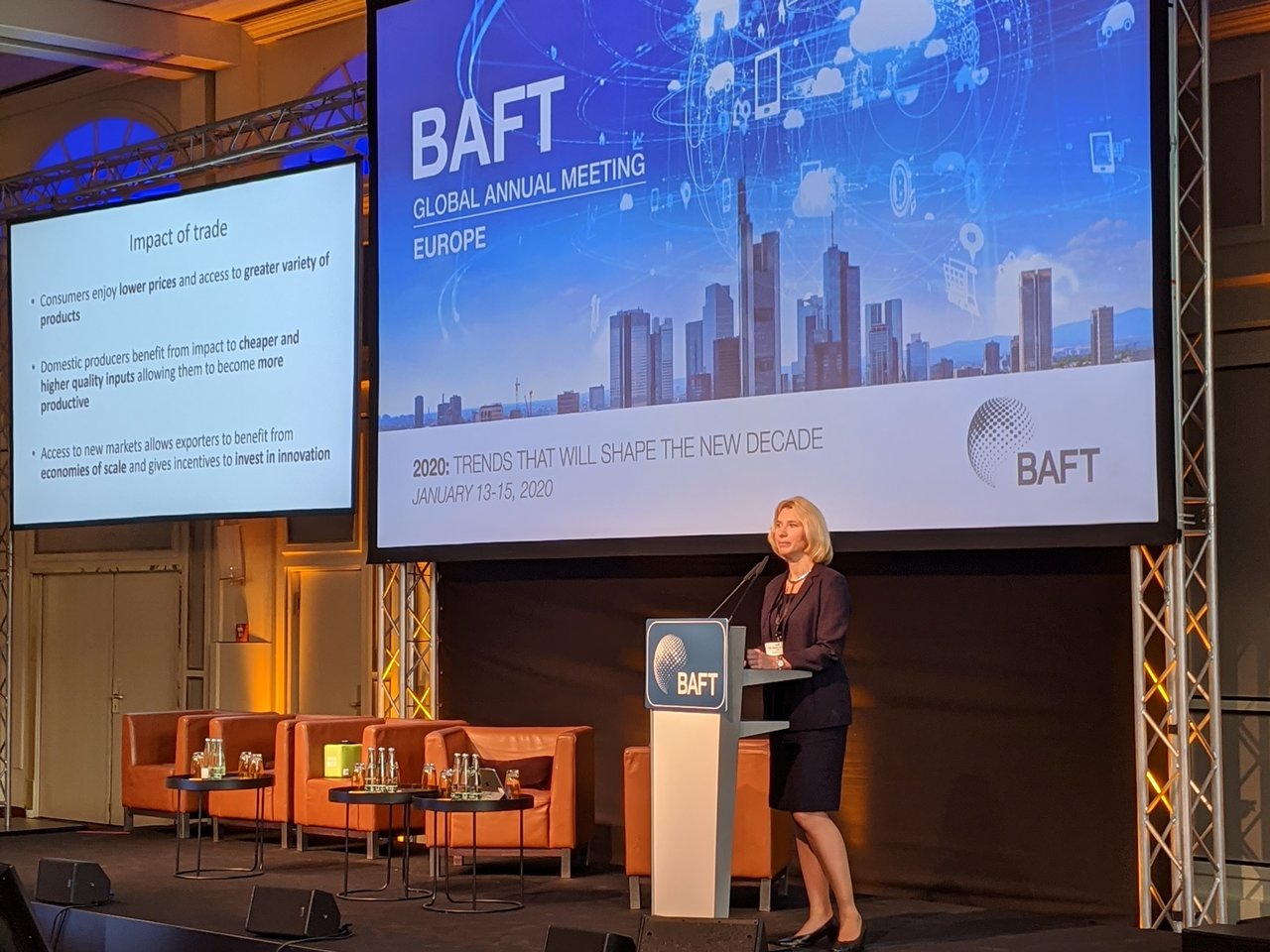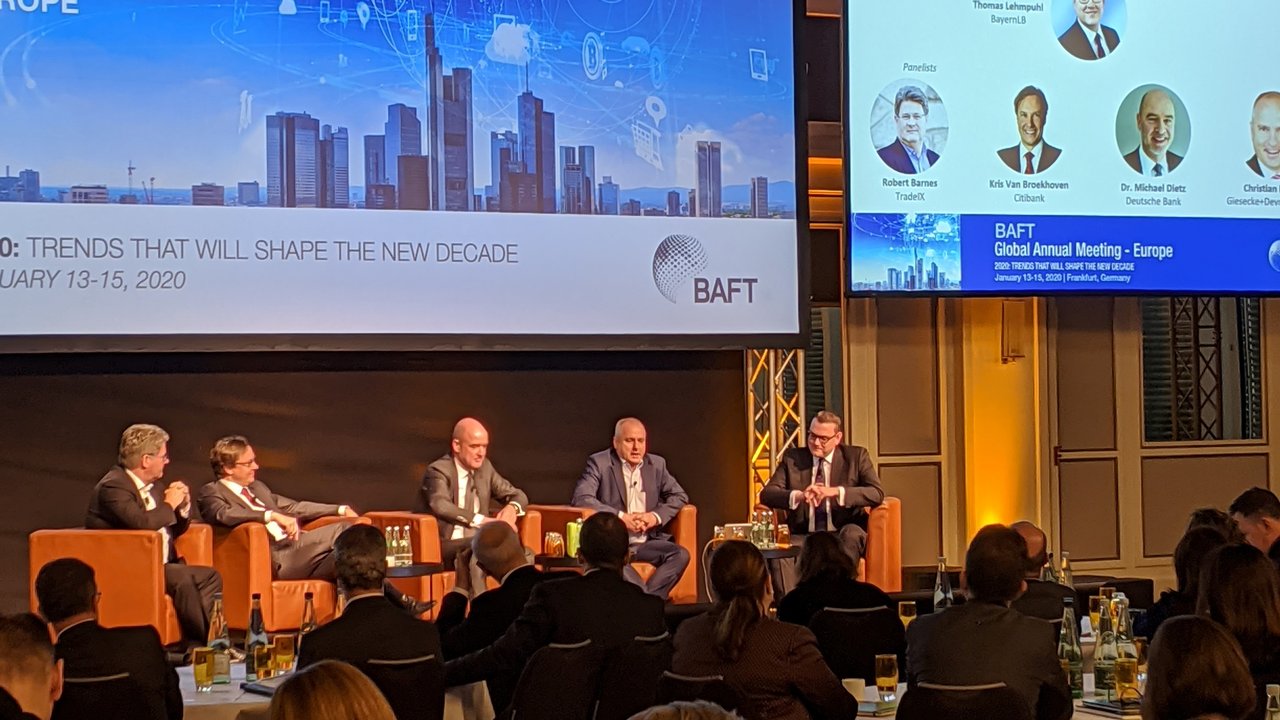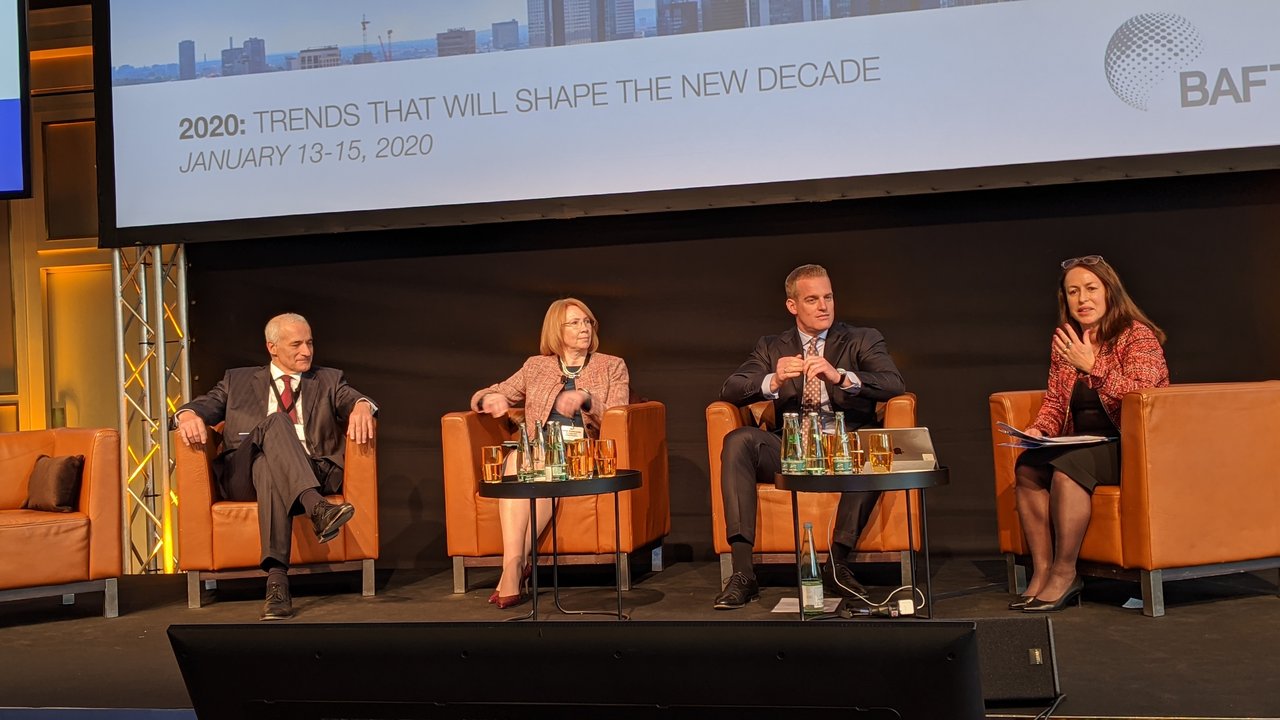January 2020
After LIBOR, digitalisation and future proofing were among the “trends to shape a new decade” discussed by delegates at the 2020 BAFT Global Annual Meeting in Frankfurt
“Trends to shape a new decade”, was the all-encompassing title of the 2020 BAFT Global Annual Meeting-Europe in Frankfurt. However, opinion was divided over whether these will include violent upheaval or a smooth transition to digitisation, reports flow’s Graham Buck
"Sustainability wasn’t an issue on the agenda, but the conference debates on trade finance emphasised how important it will be over the next 10 years"
As delegates gathered for BAFT’s 2020 Global Annual Meeting, held in Frankfurt at the beginning of a new decade, some reflected on how recurring issues from the one just gone would be playing out.
Among these are the trade tensions between the US and China that have undermined the global economy and have yet to be resolved despite the recent easing. At the beginning of the conference, the keynote address cited the “volatile mix of political, economic, societal and technology change” impacting on business.
In his opening remarks, BAFT President and CEO, Tod Burwell, said that the past year had been a busy one in developing and updating standards and practices, with guidance currently being offered on issues ranging from Islamic trade to the launch of the Fraud Indemnity Agreement and drafting clauses for Article 55. Priorities for the year ahead are an increased focus on payments and innovation; implementation of the Basel III Final Framework; the Libor replacement transition; supply chain finance (SCF) principles and accounting treatment; new education offerings; an Africa Council and the evolution of its social media and website.
Brakes on trade

Keynote speaker Dr Beata Javorcik (pictured above), Chief Economist for the European Bank for Reconstruction and Development (EBRD) then examined the genesis of the U.S. trade wars and the allegedly unfair advantage that China gained upon joining the World Trade Organisation (WTO) in 2001 – although at the time the terms had been regarded as tough. She walked delegates through how the US had threatened high tariffs to bring China to the negotiating table and extract concessions. This contrasted with its separate trade conflict with Europe, where after 70 years the scope was more limited for the two sides to devise new mutually beneficial trade agreements.
The WTO’s rules of trade had multilateral trade negotiations (MTN) at their heart, effectively diluting the ability of a powerful trading country to capture gains through bargaining down the tariffs of a weaker trading partner. The US approach in recent years has been to abandon the MTN rules although automation arguably has a significantly greater impact on US manufacturing, with, noted Javorcik, a robot worker estimated to displace six of the traditional workforce.
Coupled with other factors, such as the slowing of China’s GDP growth, a slowdown in the global automotive sector and the gains from trade liberalisation having largely been exhausted, Javorcik said the outlook was the growth of global trade to slow in the 2020s. This would impact on demand for trade finance, although the prospects for trade insurance were brighter.
Eurozone stabilisation
In a “fireside chat” session, European Central Bank (ECB) member and vice-chairman of its supervisory board Yves Mersch outlined the key theme affecting Europe’s banks over the coming decade to Michael Hogan, EMEA Head of Transaction Banking for MUFG.
The good news, they said, is that the Eurozone economy is showing signs of stabilisation and after a projected slowdown to 1.1% this year GDP growth is on course to recover to 1.4% or more in 2021. Less welcome for banks are the continuing low interest rate environment, a low rate of return on equity for the industry generally and the non-avoidable evolution of technology that spawns more digital platforms as potential competitors.
Digitisation: threat or opportunity?
A mid-morning session with the provocative title ‘Cross-border Payments in a New Decade: Who Needs Banks?” saw the first of several audience polls conducted over the event’s two days, kicking off with the question of whether banks and SWIFT would still be needed for cross-border payments by 2030? Responses were 69% yes, 22% no and the remainder ‘don’t knows’.

Deutsche Bank’s Global Head of Cash market Management, Marc Recker, said that in the new decade banks would need to prioritise overcoming the legacy systems that make payments expensive, particularly as the industry “is seeking to move into the territory of the credit card companies.” Fortunately, soundings would suggest that there is an appetite for the task; asked how they regarded digitisation 98% of delegates deemed it to be an opportunity and only 2% a threat. A separate question on whether banks would continue to play a key role in trade finance in the 2020s found 70% confident this would be maintained, while 27% saw their importance lessening but only 3% feared they would be “taken out” by fintechs and new platforms.

As Michael Dietz, Global Head of Trade Finance Flow at Deutsche Bank noted: “Fintechs are an important source of innovation while banks, admittedly, are a little dusty. But banks aren’t selling technology, but trust and it’s what customers and stakeholders look to them to provide.”
He suggested that banks would adopt a joint approach to developing trade finance, particularly in making the know your customer (KYC) process more efficient rather than there being “one leader which the others follow”.
Fellow panellist Robert Barnes, CEO of the platform TradeIX doubted that the solution for the future would be a central depositary of information that could be established and shared, which he dismissed as “a major fallacy.”
“The more realistic option is a digital passport that is transportable in Europe and elsewhere in the world,” he suggested. Centralised platforms were liable to create silos and blockchain, if deployed efficiently, offered a better way of storing and distributing information.
However, Citibank’s Global Head of Commodity trade finance, Kris Van Broekhoven, noted that while blockchain has made major progress in just five years from concept to pilots that have confirmed its potential, the “giant leap” taking it from proof of concept and into production still has to be made. Consequently, it is coming to be regarded as hype.
“Blockchain is an appealing instrument for security, but it won’t achieve the necessary scalability across the trade finance world,” forecast Dietz.
Looking to China
China’s startling economic growth rate in recent decades may now be slowing, but its credentials as a fintech powerhouse are rapidly strengthening. Liqiong Shen, Head of International Development, cash management for Greater China Corporates at BNP Paribas reports that the country’s share of global fintech venture capital (VC) investment stood at 19% in 2015 but had jumped to 46% by 2018. Over the same period the US share fell from 56% to 30%, while Europe remained a distant third with an 11% share easing to 10%.
Shen was a panellist on a session entitled ‘Lessons from China’, which analysed the country’s rapid growth and how the fintech ecosystem impacts on all areas of everyday life from ecommerce to transportation. She described digital currencies as potentially the “new battlefield” with companies excited by Facebook’s moves to launch its own cryptocurrency, Libra, in 2020 while the launch of a central bank-backed digital currency by the Peoples Bank of China is expected imminently with pilots conducted in two cities.
Alipay, China’s massive mobile and online payment platform, has been attempting to stimulate demand for its services in Europe, but had achieved less momentum due to demographics, with the continent’s elderly citizens less inclined to demand innovations such as digital wallets.
Despite this, the group has the rest of the world in its sights. Alipay announces its global strategy late last year and banks “need to figure out how they will reposition in order to take account of the opportunities.”
Sounding the alarm on IBORs
Among the first challenges of the Twenties will be the replacement of Interbank Offered Rates (IBORs) with new risk-free rates, including the transition from Libor, which is set to be discontinued after the end of 2021 – although Euribor has been granted a stay of execution of five years.
An audience poll found that more than two in three (69%) of delegates regard the transition as very relevant to their operations. Stephen Everett, head of payments, global transaction banking at Lloyds Banking Group and conference co-chair, admitted that he’d only started to appreciate the implications of replacing Libor when the topic was debated at the May 2019 annual Association of Corporate Treasurers (ACT) conference.
The afternoon session titled “Substitution of IBORs a piece of cake or…?” underlined the fact that the issue is more of a hot potato. As Dr. Jan Rosam, a partner within EMEIA Financial Services at EY noted, “The Libor fixing scandal revealed various shortcomings and as market participants created the mess they are tasked with devising the solution.” As the problem was a global one, various regional working groups were engaged in the task.”
Among the questions to be addressed are what will happen to both new and legacy transactions and also the impact of trade transactions that date back several years and incorporate specific legal agreements. Ian Fox, group IBOR transition director at Lloyds said the group had identified over 100 different transactional banking products that reference Libor and it was a question of prioritising in deciding which should be first to be redesigned. No less than 97% of global derivatives still reference Libor, while 2.6% reference the risk-free Sterling Overnight Index Average (SONIA) – an obvious replacement as it has been established since the late 1990s.
Cyberattacks and ransomware
The second day of the conference began with a breakfast session in which past graduates of the BAFT Future Leaders program outlined their expectations and future experiences. This was followed by a presentation by Esther Zwygart, a senior first officer with Lufthansa Airlines who outlined the importance of its risk response framework in responding to scenarios such as a failed engine or adverse weather. In all situations, the primary focus is ensuring that passengers are transported safely to their destination.
The session “From iPad to Notepad: The Realities of Surviving a Cyber Attack” cited the recently-revealed ransomware attack on the foreign exchange provider Travelex, just one example of the 350% increase in such incidents over the past two years.
Asked what they regarded as the greatest cyberattack threat to their organisation: nation states, organised crime, hacktivists, malicious insiders or unwitting insiders, no less than 58% of delegates responded that it was all five combined, with organised crime a distant second at 18%.
A separate poll suggested two in three delegates were “fairly confident, but not complacent” that their organisation had robust defences and 22% were “very confident” with only 10% feeling less assured. SWIFT’s Head Of Controls, Attestation and Assurance, Frank Versmessen, noted that in hacking attacks that successfully targeted banks during 2019 in transpired that none was fully compliant with anti-hacking controls.
Norsk Hydro’s Head of Cash Management And Accounting, Per Christian Lindgard, recounted how the company had to temporarily resort to Facebook for communicating when its system was shut down by a cyberattack in March 2019. The Trojan virus had been introduced via a hijacked email four months earlier and had sat in the system undetected before being activated.
Germany’s corporate treasurers’ association, Verband Deutscher Treasurer (VDT) is now focusing on cyberattack education initiatives so that members are better prepared and readier to investigate when they feel that something isn’t right, added Thomas Woelk, Head of Group Finance at Friedhelm Loh Group.
Imminent convergence
A session on the convergence of cards and instant payments was accompanied by an audience poll that found 29% believe that this will become a reality over the next 12 to 24 months, while 65% agree that it is likely in at least some areas and only 6% unconvinced. Edward Thurman, Head of Global Transaction Banking for Lloyds, noted that recently as much as 60% of global merger and acquisition activity was focused on the payments industry. Colleague and conference co-chair Stephen Everett drew attention to the Pan-European Payments System Initiative, aka PEPSI, an initiative by 2o European banks from eight countries to establish an alternative payments infrastructure to improve speed and efficiency.
There was general confidence that banks will still be active in the payments sector at the end of the 2020s, although North America’s sluggish progress was remarked on. Jason Hilton, Head of Sales And Partnerships for Visa Business Solutions - Europe
suggested that the innovation and plentiful venture capital in Silicon Valley was something of a bubble, with thousands of disparate banks across the US unconnected to one another – as evidenced by the time taken to introduce ‘chip and PIN’.
View from the top

The second day of the conference culminated in three transaction banking leaders taking to the stage to offer their views on upcoming trends, opportunities and challenges. Stefan Hoops, Deutsche Bank’s Head of Corporate Banking stressed that as banks’ traditional products were increasingly also being offered by new entrants, the industry’s members needed to focus on those areas where they were best placed to compete effectively. An increasingly important role would be as the custodian of digital assets.
In addition, over the next three to four years the onus was on the industry to find sustainability solutions for their corporate clients, which are now required to meticulously document their supply chains. Hoops also noted that recruiting new talent was considerably easier for the banks than retaining it. “Many people join our industry with the aim of moving elsewhere after a couple of years, such as to the start-ups.”

In his closing summary, conference co-chair and Deutsche Bank’s Chairman of Trade Finance, Financial Institutions Ulf-Peter Noetzel said that trade is good for innovation and innovation had been a constant theme across the event’s two days. Despite Brexit uncertainty and slowing growth in both China’s economy and the global automotive industry the outlook at the start of the new decade was encouraging.
“Sustainability wasn’t an issue on the agenda, but the conference debates on trade finance emphasised how important it will be over the next 10 years,” he added.
In what he described as a “call to arms” in his concluding address, Tod Burwell said that BAFT’s various initiatives include the upcoming launch of a new senior advisory body, the Global Payments Industry Council, that will complement the Global Trade Industry Council in promoting the issues of greatest importance to the industry and which will encourage collaboration. “BAFT is all about trying to make changes in the industry on your behalf,” he told delegates. “We want to encourage you and your colleagues to get involved.”
BAFT’s 2020 Global Annual Meeting-Europe took place in Frankfurt, Germany 13-15 January 2020
Go to Corporate Bank EXPLORE MORE
Find out more about products and services
Go to Corporate Bank Go to Corporate BankStay up-to-date with
Sign-up flow newsbites
Choose your preferred banking topics and we will send you updated emails based on your selection
Sign-up Sign-upSubscribe Subscribe to our magazine
flow magazine is published annually and can be read online and delivered to your door in print
You might be interested in
CASH MANAGEMENT, MACRO AND MARKETS {icon-book}
Leaving Libor Leaving Libor
By the end of 2021, Libor will have all but disappeared. Helen Sanders looks at what treasurers should consider amid the phasing out of this widely used benchmark interest rate
CASH MANAGEMENT, TECHNOLOGY
Adding speed to treasury digitisation Adding speed to treasury digitisation
A global pandemic and fast-changing regulation are factors accelerating the digitalisation of treasury ecosystems across Asia, as a recent webinar from The Economist Group and EuroFinance confirmed. flow ’s Graham Buck reports on the main discussion points
Trade finance and lending {icon-book}
Many rivers to cross Many rivers to cross
As China’s role on the global stage expands, Bank of China’s Yunfei Liu talks to flow about the foundations needed to build bridges in international trade
You might be interested in
CASH MANAGEMENT, MACRO AND MARKETS {icon-book}
Leaving Libor Leaving Libor
By the end of 2021, Libor will have all but disappeared. Helen Sanders looks at what treasurers should consider amid the phasing out of this widely used benchmark interest rate
Trade finance and lending {icon-book}
Many rivers to cross Many rivers to cross
As China’s role on the global stage expands, Bank of China’s Yunfei Liu talks to flow about the foundations needed to build bridges in international trade



